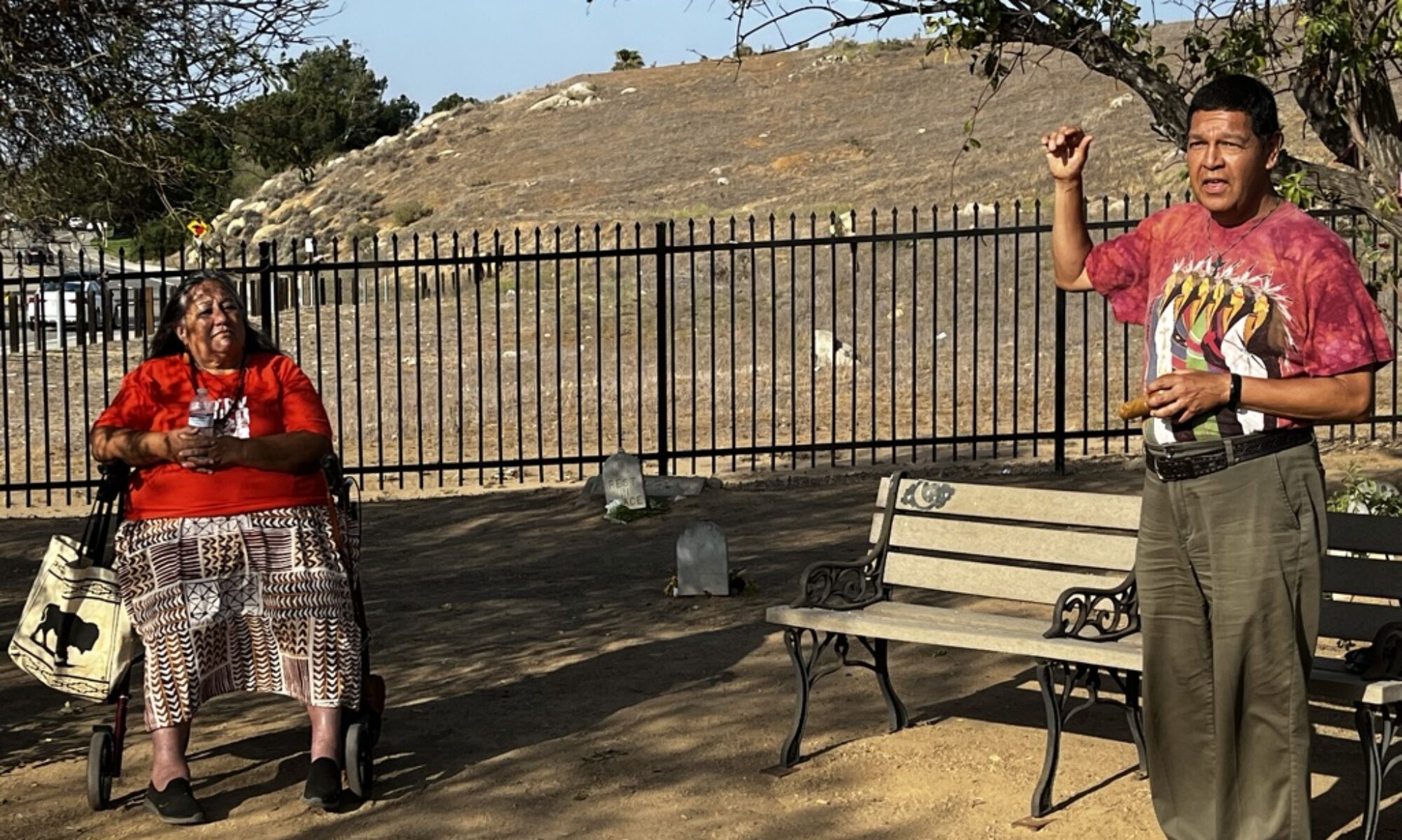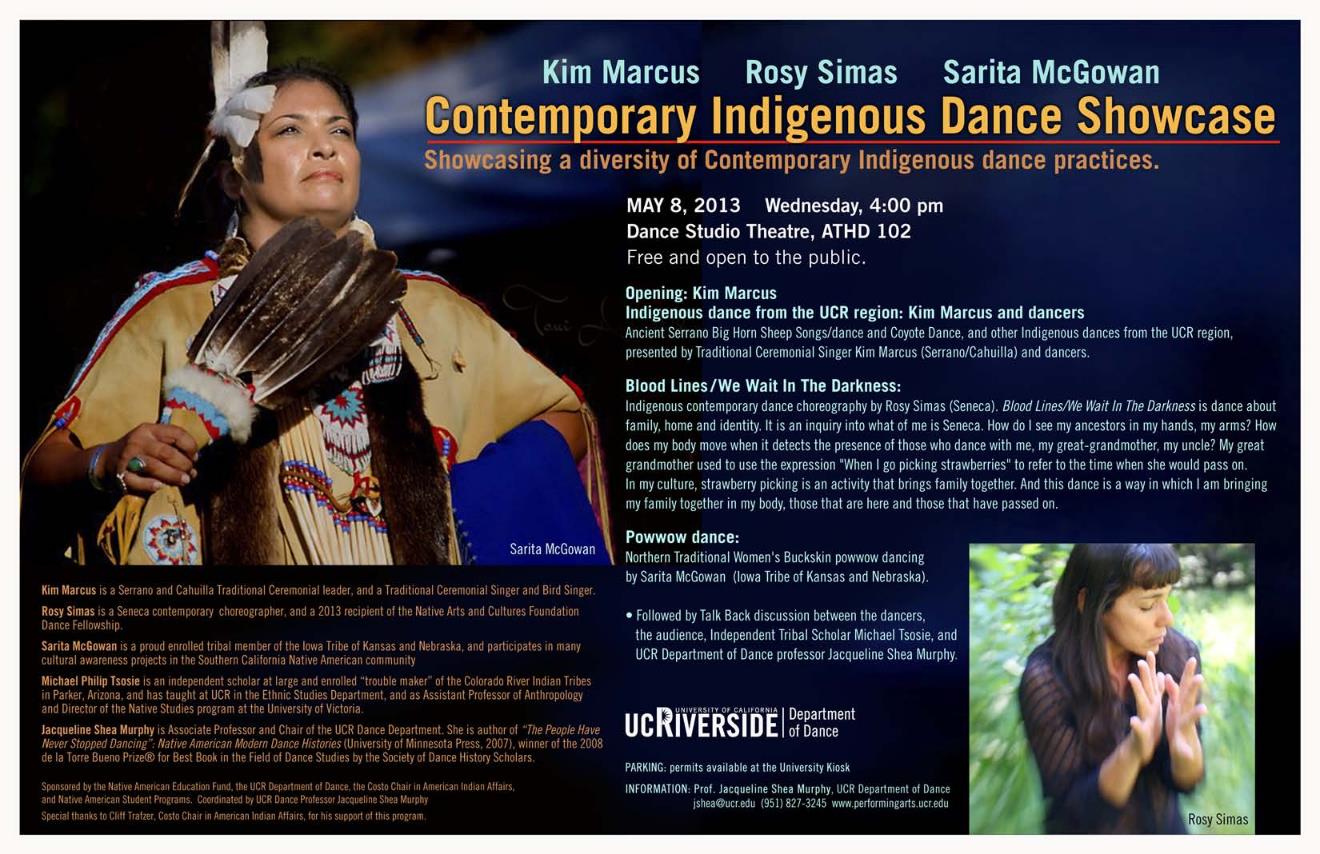Contemporary Indigenous Dance Showcase
Showcasing a diversity of Contemporary Indigenous dance practices
May 8, 2013
4:00 pm
Coordinated by Jacqueline Shea Murphy
![]()
Sponsored by the UC Riverside Native American Education Fund, the Costo Chair in American Indian Affairs, the Department of Dance, and Native American Student Programs.
Special thanks to Cliff Trafzer, Costo Chair in American Indian Affairs, fo this support of this program.
Location: UCR, Dance Studio Theatre, ATHD 102
Free and open to the public.
Opening: Kim Marcus
Indigenous dance from the UCR region: Kim Marcus and dancers
Ancient Serrano Big Horn Sheep Songs/dance and Coyote Dance, and other Indigenous dances from the UCR region, presented by Traditional Ceremonial Singer Kim Marcus (Serrano/Cahuilla) and dancers.
Blood Lines/We Wait In The Darkness: Indigenous contemporary dance choreography by Rosy Simas (Seneca)
Blood Lines/We Wait In The Darkness is a dance about family, home, and identity. It is an inquiry into what of me is Seneca. How do I see my ancestors in my hands, my arms? How does my body move when it detects the presence of those who dance with me, my great-grandmother, my uncle? My great-grandmother used to use the expression “When I go picking strawberries” to refer to the time when she would pass on. In my culture, strawberry picking is an activity that brings family together. And this dance is a way in which
I am bringing my family together^ in my body, those that are here and those that have passed on.
Powwow dance: Northern Traditional Women’s Buckskin powwow dancing by Sarita McGowan (Iowa Tribe of Kansas and Nebraska).
Followed by Talk Back discussion between the dancers, the audience, IndependentTribal Scholar Michael Tsosie, and UCR professor Jacqueline Shea Murphy.
BIOGRAPHIES
Kim Marcus is a Serrano and Cahuilla Traditional Ceremonial leader, and a Traditional Ceremonial Singer and Bird Singer. He is the father of three children, husband, and grandfather of four. Marcus’s family is responsible for reviving the Cahuilla coyote dances, under the direction of Cahuilla elders. Marcus holds a Ph.D. in Psychology and a BA in Business Administration. He is an Addiction Specialist and serves as School Counselor and Culture Department Head at Noli High School, a Native American Middle/High School. His passion is to maintain and revive customs and traditions. He also loves to run and spend time with family.
Native American contemporary choreographer Rosy Simas (Seneca) has been choreographing and teaching dance for 18 years. Her choreography has been presented in Minnesota, Montréal, Wisconsin, and California. Simas has extensive dance training in modern dance, contact improvisation, ballet, Native American, Butoh, Body-Mind Centering®, and Mahler/Klein technique. Simas values involvement in community as essential to living and art making. Simas is not only a choreographer but has held administrative and management positions in the arts and non-profits. Since 1992 she has been committed to creating opportunities for other dance makers and artists to present their work. Simas has received grants and commissions from the Minnesota Women’s Fund, Metropolitan Regional Arts Council Next Step, the Minnesota Dance Alliance, COMPAS (Community Programs in the Arts), MSAB Minnesota State Arts Board, Jerome/Intermedia Arts, the Loft Literary Center, and Momentum (the Walker Art Center/Southern Theater). Simas is a 2013 recipient of the Native Arts and Cultures Foundation Dance Fellowship.
Sarita McGowan is a proud enrolled tribal member of Iowa Tribe of Kansas and Nebraska, and she participates in the community representing Native Women and the struggle for sobriety. Sarita dances Northern Traditional Women’s Buckskin and has made all the pieces of her regalia and beadwork herself. She has been involved in many cultural awareness projects in the community, and volunteers at the California Institution for Women in Chino and the Santa Ana Federal Jail, where she speaks about Native traditions and sobriety, and at LA County Mental
Health American Indian Counseling Center, where she works to bridge cultural and co-existing mental health disorders among the Native American community. Sarita is walking the Red Road of sobriety and traditional and spiritual teachings of the old ways. and incorporates this in daily life of tradition, and spirituality, for over 7 years now. In striving to better assist the community, she has returned to college and will graduate and transfer with an AA to the university in Fall 2013 to complete a BA in sociology.
Michael Philip Tsosie is an independent scholar at large and enrolled “trouble maker” of the Colorado River Indian Tribes in Parker, Arizona. Michael has taught at UC Riverside in the Ethnic Studies Department and as Assistant Professor of Anthropology and Director of the Native Studies program at the University of Victoria. He has served as the Executive Director of the Ahamacav Research Institute, was the Director of the Colorado River Indian Tribes’ museum, and served as Creative Services Director for ATLATL, a national native arts organization. In the last five years, his research has covered diverse topics such as the affect of Fetal Alcohol Syndrome on contemporary tribal politics, concepts of Mohave
gender and sexuality in historic clothing and ornamentation, the history of political regime formation in tribal government, and on ways Mohave Bird Singing and Dancing accesses and archives contemporary Native intellectual traditions.
Jacqueline Shea Murphy is Associate Professor and Chair of the UCR Department of Dance. She is author of “The People Have Never Stopped Dancing”: Native American Modern Dance Histories (University of Minnesota Press, 2007), winner of the 2008 de la Torre Bueno Prize® for Best Book in the Field of Dance Studies by the Society of Dance History Scholars (SDHS).
Poster design: Kathleen DeAtley

